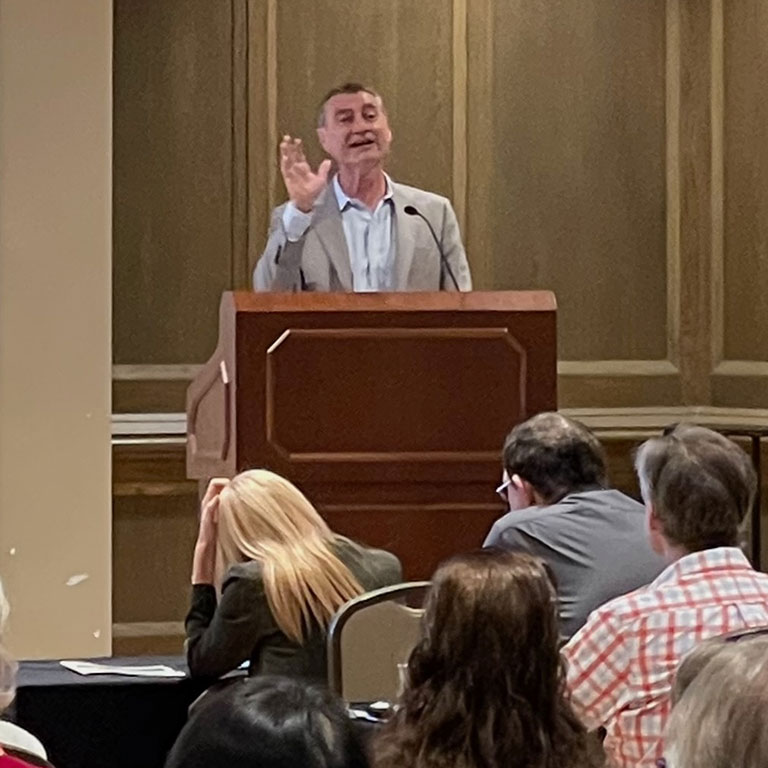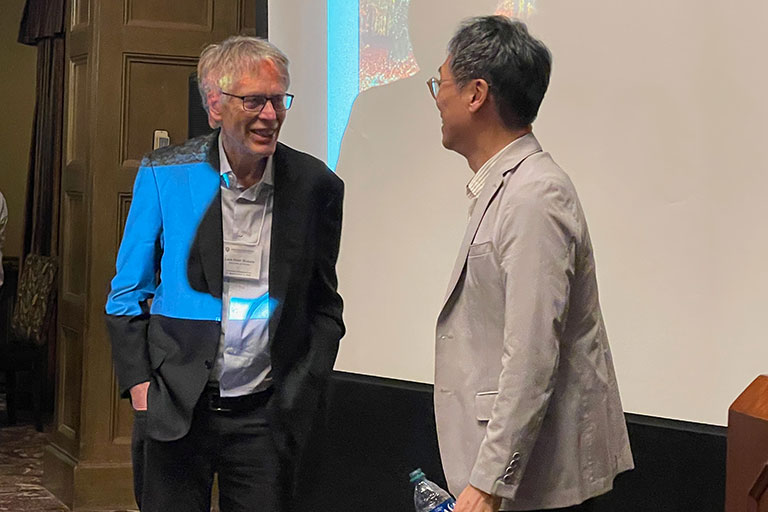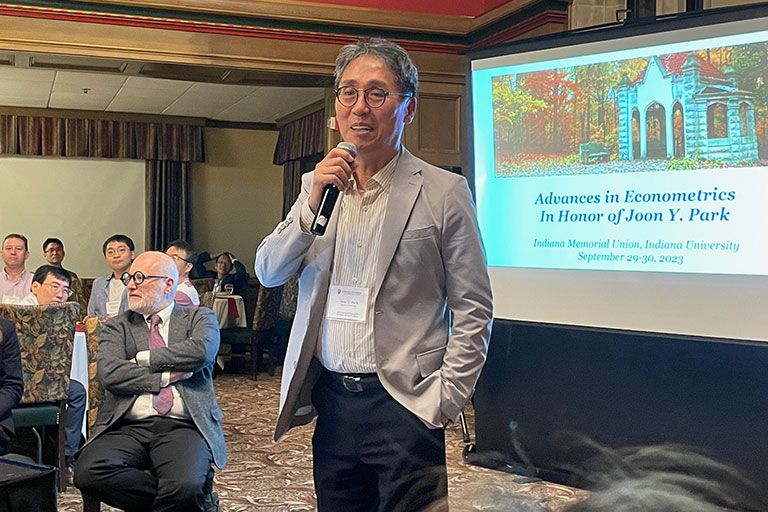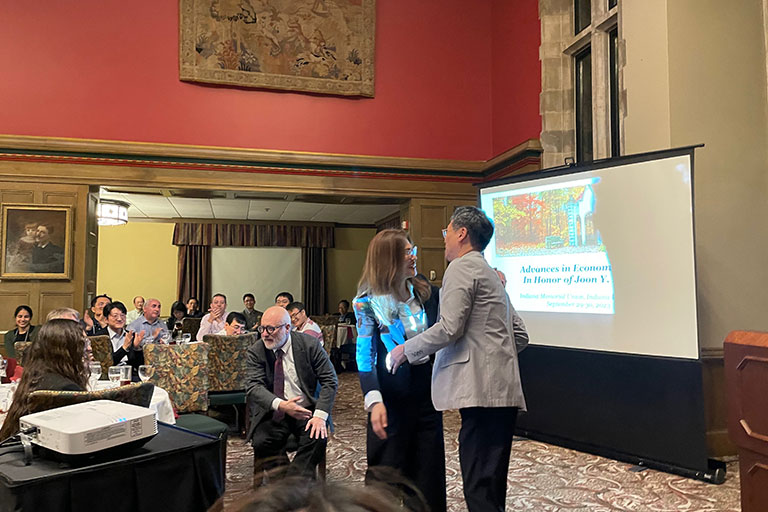We asked several conference attendees to share their thoughts about the
Advances in Econometrics Conference in Honor of Professor Joon Y. Park.
Christian Matthes
Professor, Department of Economics, Indiana University
On September 29th and 30th, IU’s Department of Economics had the distinct honor of hosting some of the world’s foremost econometricians, including the 2013 Nobel laureate Lars Peter Hansen. The purpose of this gathering was to celebrate and pay tribute to our esteemed colleague, Joon Park, for his profound contributions to the field of econometrics. It is safe to say that such a concentration of top econometricians happens rarely, with many participants noting that they have never seen anything similar.
The organizers interweaved various sessions covering the vast field of econometrics with panel discussions that delved into specific subfields within the discipline. One particularly memorable moment for me was the panel discussion on empirical macroeconomics, moderated by IU emeritus Eric Leeper. The panel featured five distinguished participants: Marcelle Chauvet from the University of California, Riverside; Steven Durlauf from the University of Chicago; Lutz Kilian from the Federal Reserve Bank of Dallas; former IU faculty member Esfandiar Maasoumi, now at Emory University; and Frank Schorfheide from the University of Pennsylvania. Together, they not only highlighted the rich history of empirical macroeconomics but also underscored the intriguing challenges it faces today.
As graduate students and colleagues, we find inspiration in Joon’s insights and contributions. What truly distinguishes him, however, is his remarkable humility and kindness. Thank you Joon!
Juan Carlos Escanciano
Research Chair in Economics and Full Professor, Universidad Carlos III de Madrid
Formerly Department of Economics, Indiana University
What a wonderful conference honoring Joon Park! On September 29-30, 2023, the Economics Department at Indiana University hosted a fantastic event celebrating the career of Joon Y. Park. Joon has made fundamental contributions to various areas of econometrics, most notably in non-stationary time series analysis. He has played a significant role in training and mentoring the “Korean econometrics school” and has served as a role model for many generations of young econometricians worldwide, including myself. Joon’s kindness, friendship, and open heartedness extend beyond the professional sphere. The conference attracted an impressive array of some of the most influential researchers in econometrics, a testament to Joon’s professional and personal stature within the field.
On a personal note, attending the Advances in Econometrics (AiE) conference in honor of Joon was a heartfelt and profoundly emotional experience for me. It felt like coming back home. The conference brought together many of my beloved friends, colleagues, researchers, and institutions in one single place. The beautiful IU Bloomington campus and the marvelous IMU building bore witness to the complete success of the organizing committee, led by the endlessly energetic Yoosoon Chang, and the unwavering efficiency of the IU Econ staff, including Howard, Chris, Paulette, and many others. My heartfelt thanks go to all of them for making this conference possible. I am also deeply grateful to Tom Fomby, Senior Editor of AiE, for sponsoring this conference and allowing me, early in my career, to be part of the AiE family. Thanks are due to the Economics Department at IU for hosting this exceptional conference and showcasing to the world the outstanding human capital present in the IU Economics Department in Bloomington, Indiana. Last but certainly not least, my sincere gratitude goes to Joon Park for being an inspiring role model. I am profoundly thankful to all of them for allowing me to be part of this extended IU family.
Steven Durlauf
Steans Professor in Educational Policy
Director of the Stone Center for Research on Wealth Inequality and Mobility
Harris School of Public Policy, University of Chicago
Indiana University’s Advances in Econometrics Conference, held in honor of Joon Park, is a tribute to Joon’s preeminence as a scholar as well as the vibrant IU intellectual community of which Joon is a vital part. Outside of annual meetings of professional societies, the conference was surely the most impressive econometrics meeting of 2023, attracting a remarkable set of scholars from across the world and covering an equally remarkable range of research areas.
A major part of the two days involved honoring Joon in conversations and speeches large and small. But the bigger honor that was done to Joon involved the way that the conference highlighted his deep and lasting contributions to econometric theory. Whether one considers nonstationary time series, models of switching statistical regimes, high frequency data, or functional data analysis, Joon has developed tools that not only exhibit the highest mathematical sophistication, pushing the methodological frontier, but also matter for empirical work. Whether one considers macroeconomics, finance, climate change or inequality, our understanding of substantive phenomena has been greatly enhanced by the tools Joon has created. Joon Park econometrics has enriched the study of macroeconomics, finance, climate change, and inequality. As such, this places Joon among the giants of the economics profession.
J. Isaac “Zack” Miller
Professor and Associate Chair, Department of Economics, University of Missouri
Yoosoon Chang (Professor of Economics, Indiana University), Sokbae “Simon” Lee (Professor of Economics, Columbia University), and I (J. Isaac “Zack” Miller, Professor and Associate Chair of Economics, University of Missouri) co-organized a conference hosted by the IU Department of Economics in honor of Professor Joon Y. Park (Professor of Economics and Wisnewsky Professor of Human Studies, Indiana University) on September 29-30. The conference was originally scheduled for 2020 to coincide with Professor Park’s 65th birthday and submission to a volume of Advances in Econometrics that the three of us edited in honor of him. The volume was published earlier this year and included contributions from many of the conference participants.
To convey the importance and impact of the conference, I paraphrase two very well-known econometricians who attended. One said off-hand to me that if a bomb went off it would wipe out the econometrics and particularly time series econometrics profession. Another said publicly during the conference that he was unlikely to see such a large group of notable econometricians in the same place in his lifetime. And, yes, that gathering happened not in Cambridge or Berkeley or Oxford, but right here in Bloomington.
Following the success of similar Advances in Econometrics branded conferences, I urged Professor Chang to consider organizing the conference. Although I’ll claim a small amount of credit along with Professor Lee for urging Professor Chang to consider such a conference, organizing the program, and securing some of the funding for the conference, the vision, detailed execution, and ultimate result of this fantastic conference were borne out of Professor Chang’s hard work, love, and admiration of her partner in her personal and professional life, Professor Park.
I first met Professor Chang in 2000 and Professor Park in 2002, when he moved to Rice University, where I was a Ph.D. student. Professor Chang had recently received tenure, and after working abroad and particularly at Seoul National University for many years, Professor Park was recruited and moved back to the U.S. to be near her. This began a close multidecadal research collaboration between the two of them at Rice, then at Texas A&M, and now at IU. I was the first Ph.D. student to directly benefit from this collaboration, and I continue to collaborate with them on research projects two decades later.
A cliché, but a true one: it has been my honor to work with Professors Park and Chang over the years. How do they get so much done? They utilize comparative advantages between themselves and their collaborators, who are often their former students who they trained and know well. Both hold themselves and those around them to the highest and most rigorous standards, and both are outstanding researchers in their own right. But while Professor Park focuses on theoretical development and initiation of research, Professor Chang focuses on the logistical development and completion of research. Additional collaborators help anywhere in the process that is most useful, such as coding, data work, or writing up and pitching the results.
Jihyun Kim
Associate Professor, Department of Economics, Sungkyunkwan University
Research Associate, Toulouse School of Economics
The conference in honor of Joon Y. Park is indeed a remarkable occasion. Without question, Joon has made noteworthy and enduring contributions to the field of econometrics, delving into a wide array of intricate subjects such as nonstationary time series, continuous-time econometrics, financial econometrics, and functional data analysis. My inability to attend this celebration weighs heavily on me.
From 2009 to 2014, I had the privilege of being under Joon’s mentorship during my Ph.D. years, and I have always been impressed by his approach to tackling exceedingly complex and abstract problems. Throughout my doctoral journey, Joon and I regularly met for lunch at a local sandwich place. At that time, I was interested in the asymptotics of nonlinear transformations of continuous-time processes, which could be nonstationary or stationary processes with fat tails. We’d sit down with our pens and sketch out the math on napkins. We went through a ton of napkins because we were aiming for a really broad theory. We ended up collecting all those scribbled napkins and turned them into our first paper, which was published in the Journal of Econometrics. It’s still my all-time favorite paper.
Joon’s role in my life extended far beyond that of an academic advisor and co-author. Following the completion of my Ph.D. at Indiana, my first job was as an assistant professor at the Toulouse School of Economics. It was there that I forged a friendship, which transcended the professional realm later, with Nour Meddahi who is also a very close friend of Joon. Together we wrote our first paper that is closely related to Joon’s work on the nonlinear transformation of continuous-time processes. Within the context of that paper, our focus was directed towards the study of volatility regression under fat tails. The crux of our contribution lay in unveiling the spurious nature of volatility regression under such conditions, with the Ordinary Least Squares estimator converging to a stochastic variable. In our quest, we drew extensively from the technical foundation laid by Joon, who also offered invaluable insights and feedback.
In conclusion, Joon is more than a mentor or co-author to me; he’s like family. While my absence at this conference is deeply regrettable, I eagerly anticipate the opportunity to reconnect with Joon and Yoosoon.









 The College of Arts
The College of Arts